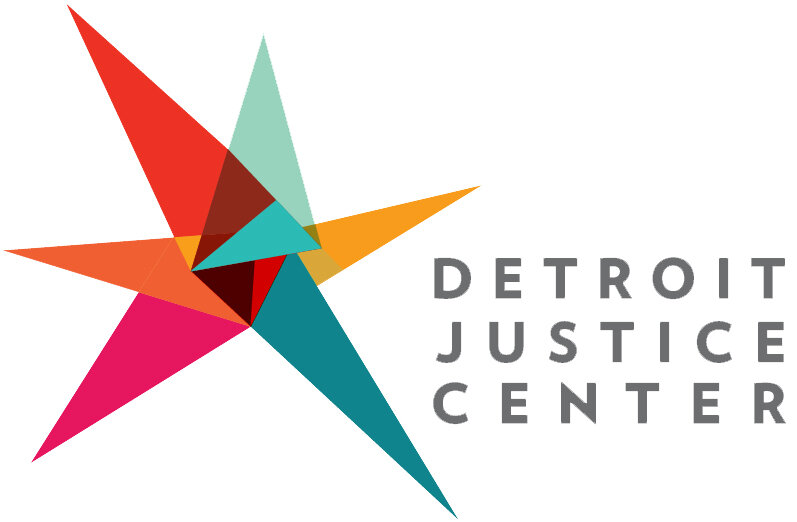An Interview with Office Manager & Paralegal, Angel McKissic
Casey Rocheteau: How did you first hear about the Detroit Justice Center?
Angel McKissic: I heard Amanda speak at the Urban Consulate in February 2017, where she presented the idea for what would later become the Detroit Justice Center. Her presentation impacted me, and it was clear that she was going to do important and necessary work in Detroit. About one year later when I saw the job listing posted on social media, I was instantly reminded of the dream she shared with the crowd that night. I felt compelled to apply, and it was one of the best decisions I have made both personally and professionally.
CR: What was appealing to you about the idea?
AM: I thought Amanda did an excellent job of thoughtfully assessing the state of the legal system in the city. She took the time to identify existing gaps in creativity, imagination, and innovation specific to the thinking around systems of justice. As such, I was attracted to the innovative and creative conceptualization of what she put forth as being possible for our city. I thought then, and I still retain the belief, that DJC’s mission embodies generosity and a redefined understanding of justice. Furthermore, I have always been drawn to the helping professions, and the position with DJC appealed to that sensibility.
CR: Could you say a little bit more about your work in the helping professions?
AM: I’m completing a master’s degree in clinical psychology, which I am on track to complete this summer. In addition to my role at DJC, I work as an intern psychotherapist at a residential substance abuse treatment center in Pontiac. My client caseload consists exclusively of women who are court-ordered to treatment. In addition to contending with addiction, my clients also have to navigate some of the legal barriers that DJC works to remedy through the legal services practice. So, from my purview, mental health issues are frequently compounded by interactions with the legal system. In my capacity at DJC I manage operational tasks, and at the treatment center, I get to explore what conditions resulted in my clients’ court involvement. My clinical work also forces me to confront the reality that incarceration is traumatizing. My work with clients allows me to formulate intimate portraits of what the experience of being incarcerated is like for them. These women often lose their jobs and sometimes their children as a result of being court involved. Thus, the goal of our work together is to arrive at a place where they can begin to piece their lives back together. On the whole, I support the legal needs of clients at DJC while also supporting the social, emotional, and psychological needs of my clients through my work as a student therapist.
CR: For you, why is professional mental health treatment preferable to incarceration?
AM: My primary focus concerning the broken legal system, is the psychological ramifications on an individual’s mental health. In the criminal justice reform arena, discussions primarily circulate around practical and tangible issues, such as securing employment or housing for returning citizens. Of course, these are real issues that impact an individual’s livelihood and overall stability. Even with this in mind, it is important to understand that people do not necessarily commit crimes as a direct result of unemployment or homelessness. This certainly has an impact on an individual’s behavior, but when we look at violent crime specifically, it becomes difficult to identify its etiology due to the overlapping influences of psychological wellness, unresolved trauma, undiagnosed mental illness, etc.
For me, our current legal system is designed to address symptoms of trauma, not its origins. For instance, if we’re looking at a young person who’s in a gang and has committed murder, the legal system doesn’t consider the individual’s life circumstance, such as the presence and involvement of caregivers, substance abuse issues, poverty, and so on. These factors must be part of the broader discussion on criminality and justice. What is imperative to understand is that so-called “criminal behavior” serves a function for the individual who enacts it. Instead of perpetuating systems that respond to the symptoms of mental illness and trauma punitively, we need an entire overhaul of the system. If we do not address the myriad of circumstances and social conditions that lead to “criminal behavior” our communities will never be able to heal. As is demonstrated in the scientific literature, deterrence is not only ineffective in preventing crime, the very concept lacks a consideration, specifically, of the nuanced realities of black and brown lives in this country.
At the crux of the ineffectual legal system, we find ourselves operating within, is the absence of emotional and psychological literacy. Thus, places like DJC are uniquely positioned to demand a pivot from a disciplinary and retaliatory justice paradigm to one that centers human experience and vulnerability and prioritizes healing and restoration. Caging people is convenient for the system, but true justice requires folks to show up, listen for understanding, and support communities in their efforts to restore what was lost.
CR: Given that most jails and prisons ostensibly provide mental health services, what does that look like and why hasn’t it been effective?
AM: Most of the mental health staff within a jail or prison are undertrained and overwhelmed with large caseloads. Consequently, many of the staff providing mental health services are not adequately trained to treat the incredibly complex issues that many of the clients enter the system with. Furthermore, it is immensely difficult to shield one’s clinical work from the culture within which they are operating. For example, the adoption of jail and prison language (referring to clients as inmates or offenders) are not conducive to effective therapeutic work, and often have the effect of limiting the therapist’s regard for the client. Moreover, being incarcerated is a traumatizing experience and to expect healing to result from treatment received in jail or prison is ill-informed. Jails and prisons functioning as mental health treatment facilities is inherently antithetical to the goals of therapy. What’s more, jails and prisons are, by design, intended to be punitive and disempowering. This is incompatible with healing centered practices; thus the urgent need for systemic change.
CR: On a lighter note, where are some of your favorite places to go in Detroit?
AM: I love the DIA, I take my children there frequently. The Detroit Film Theater is also a great treasure. Belle Isle, of course. I love riding my bike around the isle and exploring the natural landscape with the girls. I also love Eastern Market, it is amazing to have witnessed its expansion over time. I think we are really lucky as Detroiters to have such a space.


